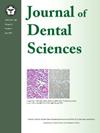台湾中老年人口腔健康相关生活质量与精神抑郁有显著关联。
IF 3.4
3区 医学
Q1 DENTISTRY, ORAL SURGERY & MEDICINE
引用次数: 0
摘要
背景/目的:随着人口的逐渐老龄化,口腔健康已成为与心理健康并存的重要问题。本研究旨在探讨中老年人口腔健康相关生活质量(OHRQoL)与精神抑郁之间的关系:基于 2015 年台湾老龄化纵向研究,共纳入 7631 名参与者。采用台湾版口腔健康影响档案问卷对OHRQoL进行评估,将个体分为五个类别(优、良、一般、差和极差)。OHRQoL优秀组被视为参照组。抑郁状况使用 10 项抑郁流行病学研究中心简表问卷进行评估。描述性统计和皮尔逊卡方检验分别用于阐明人口统计学特征和五个 OHRQoL 组间的差异。在控制了混杂因素后,采用多变量逻辑回归分析了OHRQoL与抑郁症的关系:结果:在控制了年龄、性别、婚姻状况、生活状况、居住状况、宗教信仰、体育锻炼水平、个人或家庭压力等协变量后,出现精神抑郁的调整OR值为1.45(95% CI:1.198-1.760,P P P P P 结论:口腔健康相关生活质量对抑郁症的发生具有负面影响:口腔健康相关生活质量与中老年人的精神抑郁呈负相关。本文章由计算机程序翻译,如有差异,请以英文原文为准。
Significant association of oral health-related quality of life with mental depression in middle-aged and older Taiwanese adults
Background/purpose
With the gradual aging of the population, oral health has emerged as a critical concern alongside mental well-being. This study endeavored to investigate the relationship between oral health-related quality of life (OHRQoL) and mental depression in middle-aged and older population.
Materials and methods
Based on the Taiwan Longitudinal Study on Aging in 2015, 7631 participants were enrolled. OHRQoL was assessed utilizing the Taiwan version of the Oral Health Impact Profile questionnaire, stratifying individuals into five categories (excellent, good, fair, poor, and very poor). The excellent OHRQoL group was regarded as the reference group. Depression status was evaluated using the 10-item Center for the Epidemiological Studies of Depression Short Form questionnaire. Descriptive statistics and Pearson's chi square test were applied to elucidate the demographic characteristics and the differences among the five OHRQoL groups, respectively. Multivariable logistic regression was applied to elucidate the association of OHRQoL with depression after controlling for confounding factors.
Results
After controlling for covariates such as age, sex, marital status, living status, residency status, religion, level of physical activity, and pressures arising from personal or familial concerns, the adjusted ORs of experiencing mental depression were 1.45 (95% CI: 1.198–1.760, P < 0.001), 2.25 (95% CI: 1.791–2.829, P < 0.001), 3.88 (95% CI: 2.730–5.525, P < 0.001), and 6.87 (95% CI: 3.116–15.129, P < 0.001) for the good, fair, poor, and very poor OHRQoL groups, respectively, which demonstrated a gradually increased relationship.
Conclusion
Oral health-related quality of life was negatively associated with mental depression in middle-aged and older adults.
求助全文
通过发布文献求助,成功后即可免费获取论文全文。
去求助
来源期刊

Journal of Dental Sciences
医学-牙科与口腔外科
CiteScore
5.10
自引率
14.30%
发文量
348
审稿时长
6 days
期刊介绍:
he Journal of Dental Sciences (JDS), published quarterly, is the official and open access publication of the Association for Dental Sciences of the Republic of China (ADS-ROC). The precedent journal of the JDS is the Chinese Dental Journal (CDJ) which had already been covered by MEDLINE in 1988. As the CDJ continued to prove its importance in the region, the ADS-ROC decided to move to the international community by publishing an English journal. Hence, the birth of the JDS in 2006. The JDS is indexed in the SCI Expanded since 2008. It is also indexed in Scopus, and EMCare, ScienceDirect, SIIC Data Bases.
The topics covered by the JDS include all fields of basic and clinical dentistry. Some manuscripts focusing on the study of certain endemic diseases such as dental caries and periodontal diseases in particular regions of any country as well as oral pre-cancers, oral cancers, and oral submucous fibrosis related to betel nut chewing habit are also considered for publication. Besides, the JDS also publishes articles about the efficacy of a new treatment modality on oral verrucous hyperplasia or early oral squamous cell carcinoma.
 求助内容:
求助内容: 应助结果提醒方式:
应助结果提醒方式:


